浙江专版2020中考英语复习方案第一篇教材考点梳理话题写作六
- 格式:pptx
- 大小:267.18 KB
- 文档页数:31
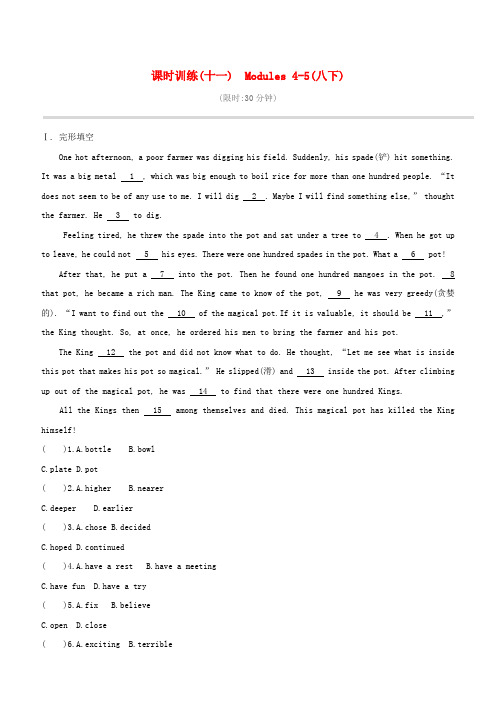
课时训练(十一) Modules 4-5(八下)(限时:30分钟)Ⅰ. 完形填空One hot afternoon, a poor farmer was digging his field. Suddenly, his spade(铲) hit something. It was a big metal 1 , which was big enough to boil rice for more than one hundred people. “It does not seem to be of any use to me. I will dig 2 . Maybe I will find something else,” thought the farmer. He 3 to dig.Feeling tired, he threw the spade into the pot and sat under a tree to 4 . When he got up to leave, he could not 5 his eyes. There were one hundred spades in the pot. What a 6 pot!After that, he put a 7 into the pot. Then he found one hundred mangoes in the pot. 8 that pot, he became a rich man. The King came to know of the pot, 9 he was very greedy(贪婪的). “I want to find out the 10 of the magical pot.If it is valuable, it should be 11 ,” the King thought. So, at once, he ordered his men to bring the farmer and his pot.The King 12 the po t and did not know what to do. He thought, “Let me see what is inside this pot that makes his pot so magical.” He slipped(滑) and 13 inside the pot. After climbing up out of the magical pot, he was 14 to find that there were one hundred Kings.All the Kings then 15 among themselves and died. This magical pot has killed the King himself!( )1.A.bottle B.bowlC.plateD.pot( )2.A.higher B.nearerC.deeperD.earlier( )3.A.chose B.decidedC.hopedD.continued( )4.A.have a rest B.have a meetingC.have funD.have a try( )5.A.fix B.believeC.openD.close( )6.A.exciting B.terribleC.magicalD.beautiful( )7.A.mango B.spadeC.KingD.man( )8.A.In B.WithC.WithoutD.By( )9.A.but B.soC.orD.and( )10.A.price B.secretC.costD.wealth( )11.A.the farmer's B.mineC.yoursD.his( )12.A.looked after B.looked forC.put awayD.looked at( )13.A.fell B.jumpedC.joinedD.felt( )14.A.relaxed B.excitedC.shockedD.bored( )15.A.stayed petedC.discussedD.foughtⅡ.阅读理解When you feel sick, you go to the doctor. She checks your fever, and asks what you've been thinking about recently. When you leave, she gives you not only some medicine but also a list of thinking skills that you are supposed to practise daily. She says that the way you think is causing some of your illness.Doctors and scientists who study the human mind and try to explain why people behave in the way they do are called psychologists(心理学家). They are starting to believe that your brain is connected to every part of your body through your nervous system(神经系统).Now scientists have proved that how you think and feel can have an influence on the health of your body. Stress can help us better understand this link(关联).Stress is caused whenever there is a problem or a change in your life. In fact, stress is necessary. Without stress, we would never learn anything or grow or change. But too much stress can hurt you.It can weaken your body's protection so that you are more likely(可能的) to catch diseases. It can even make you more likely to have an accident.What can you do about stress? First, you can try to find ways to change things so you aren't under so much stress. You can set up a plan to finish homework or go to a doctor or a psychologist to try to work things out with your family or your friends. But sometimes you can't change a stressful situation. Sometimes you don't even want to.A big change might be a good change, but it will still be stressful.The link between your body and brain works in two ways. Your body can help your mind deal with stress. If you are under stress, you need to take especially good care of your body. It's important to get enough sleep and eat nutritious(有营养的) meals. Another thing that you can do is daily exercise, like running and jogging.1.A psychologist may help you with . ( )A.all your illnesses and abilitiesB.your thoughts and behaviorC.your mind and nervous systemD.your sleeping and daily exercise2.What does the underlined word “weaken” in Paragraph 3 mean? ( )A.strengthenB.protectC.reduceD.prevent3.Which of the following is TRUE according to the passage? ( )A.When we feel stressed, we should sleep less.B.Diseases and accidents are all caused by stress.C.We shouldn't do some sports if we are under stress.D.Everyone needs stress to improve himself or herself.4.From the underlined sentence of Paragraph 4 we can infer that . ( )A.it's difficult to change a stressful situationB.It's not stressful when a good change happensC.a big change will cause another stressful situationD.a stressful situation can't be changed without any effortⅢ.词汇运用(ⅰ)用方框中所给词语的适当形式填空。
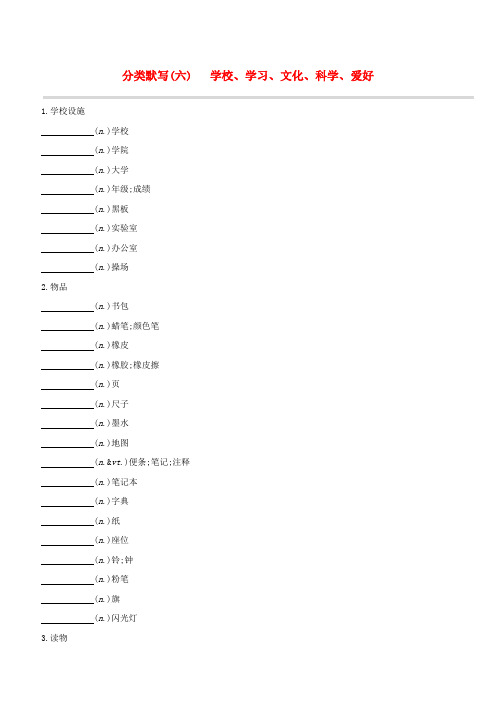
分类默写(六) 学校、学习、文化、科学、爱好1.学校设施(n.)学校(n.)学院(n.)大学(n.)年级;成绩(n.)黑板(n.)实验室(n.)办公室(n.)操场2.物品(n.)书包(n.)蜡笔;颜色笔(n.)橡皮(n.)橡胶;橡皮擦(n.)页(n.)尺子(n.)墨水(n.)地图(n.&vt.)便条;笔记;注释(n.)笔记本(n.)字典(n.)纸(n.)座位(n.)铃;钟(n.)粉笔(n.)旗(n.)闪光灯(n.)艺术(n.)戏剧(n.)诗(n.)故事;小说(n.)意见;评论(n.)主题(n.)品质;角色(n.)文本(n.)文件(n.)新闻(n.)报纸(n.)杂志(n.)(文章等的)一节;一段(n.)表格;形式;结构(n.)笑话(n.)日报(adj.)每日的(n.)抄本(n.)漫画(n.)话题(n.)符号;标志;象征4.学科(n.)学科(n.)英语(n.)语文(n.)数学(n.)科学(n.)美术(n.)音乐(n.)体育(n.)物理(n.)化学(adj.)初级的;初等的(adj.)中级的5.问题(n.)问题(vt.)询问(v.&n.)回答;回复(n.)答案;钥匙(n.)回答;答复(v.)询问(n.)问题;难题(n.)问题;麻烦6.学习内容(n.)知识(n.)家庭作业(n.)课题;作业;项目(n.)功课;教训(n.)文本;课文(n.)单元(n.)句子(v.)发音(n.)发音(n.)语言(n.)文件;公文(n.)技能;技巧(n.)字母;信(n.)单词(n.)词语;表达(n.)材料(n.)目标;物体;宾语7.学习过程(v.)教(v.)学;学会(n.)方法;办法(v.)解释;说明(n.)实验(n.)研究(n.)练习(v.)练习;实践(v.)纠正;改正(adj.)正确的;恰当的(n.)注意;关心(v.)解决;解答(难题等)(n.)错误(v.)弄错(v.)明白;理解;懂得(v.)表达(v.)翻译(n.)过程;课程(v.)培训(n.)训练(v.)创造(n.)调查(n.)任务(n.)进步;进展(n.)意义;意思(v.)标记(n.&v.)规定;统治(n.)学期;术语(n.)组;群8.学习评估(n.)考试;测试;检查;审查(vt.&n.)测试;考查;试验(n.)水平(n.&adj.)标准;标准的(n.)成绩(n.)结果;效果(n.)比赛;竞赛(n.)奖品;奖金(v.)授予;给予奖(金)(n.)演讲(vt.)讨论(v.)失败;不及格;衰退(v.)失去;失败(vt.)通过(vt.)改进;更新(n.&v.)回答;答复(v.)重复(vt.)校对;核对;检查;批改9.历史文化(adj.)社会的(n.)社会;群体(adj.)古代的;古老的(n.)祖先(v.)传播;延伸(n.)文化(n.)习俗;习惯;传统(n.)战争(vt.)创造;发明(n.)发明;创造(n.)机器(n.)科技;技术(n.)科学(adj.)科学的(adj.)电子的11.兴趣爱好(vt.)喜欢;喜爱(vt.)欣赏;享受……的乐趣;喜欢(n.)爱(vt.)热爱;很喜欢(v.)更喜欢(=like…better)(v.)使……满意(adj.)喜爱的(n.)特别喜爱的人或物(v.)关心;在乎(vt.&n.)恨;讨厌(n.)业余爱好;嗜好(n.)兴趣;趣味(n.)(电影、运动等的)迷;爱好者【参考答案】1.学校设施school (n.)学校college (n.)学院university (n.)大学grade (n.)年级;成绩blackboard (n.)黑板lab=laboratory (n.)实验室office (n.)办公室playground (n.)操场2.物品schoolbag (n.)书包crayon (n.)蜡笔;颜色笔eraser (n.)橡皮rubber (n.)橡胶;橡皮擦page (n.)页ruler (n.)尺子ink (n.)墨水map (n.)地图note (n.&vt.)便条;笔记;注释notebook (n.)笔记本dictionary (n.)字典paper (n.)纸seat (n.)座位bell (n.)铃;钟chalk (n.)粉笔flag (n.)旗flash (n.)闪光灯3.读物art (n.)艺术play (n.)戏剧poem (n.)诗story (n.)故事;小说comment (n.)意见;评论theme (n.)主题character (n.)品质;角色text (n.)文本document (n.)文件news (n.)新闻newspaper (n.)报纸magazine (n.)杂志passage (n.)(文章等的)一节;一段form (n.)表格;形式;结构joke (n.)笑话daily (n.)日报(adj.)每日的copy (n.)抄本cartoon (n.)漫画topic (n.)话题symbol (n.)符号;标志;象征4.学科subject (n.)学科English (n.)英语Chinese (n.)语文maths(美math) (n.)数学science (n.)科学art (n.)美术music (n.)音乐PE (n.)体育geography (n.)地理physics (n.)物理chemistry (n.)化学primary (adj.)初级的;初等的middle (adj.)中级的5.问题question (n.)问题(vt.)询问answer (v.&n.)回答;回复key (n.)答案;钥匙reply (n.)回答;答复ask (v.)询问problem (n.)问题;难题trouble (n.)问题;麻烦6.学习内容knowledge (n.)知识homework (n.)家庭作业project (n.)课题;作业;项目lesson (n.)功课;教训text (n.)文本;课文unit (n.)单元sentence (n.)句子pronounce (v.)发音pronunciation (n.)发音language (n.)语言document (n.)文件;公文skill (n.)技能;技巧letter (n.)字母;信word (n.)单词material (n.)材料grammar (n.)语法composition (n.)作文object (n.)目标;物体;宾语7.学习过程teach (v.)教learn (v.)学;学会method (n.)方法;办法explain (v.)解释;说明experiment (n.)实验research (n.)研究practice (n.)练习practise (美practice) (v.)练习;实践correct (v.)纠正;改正(adj.)正确的;恰当的attention (n.)注意;关心solve (v.)解决;解答(难题等)mistake (n.)错误(v.)弄错understand (v.)明白;理解;懂得express (v.)表达translate (v.)翻译course (n.)过程;课程train (v.)培训training (n.)训练create (v.)创造survey (n.)调查task (n.)任务progress (n.)进步;进展meaning (n.)意义;意思mark (v.)标记term (n.)学期;术语group (n.)组;群team (n.)队line (n.)排;行8.学习评估exam=examination (n.)考试;测试;检查;审查test (vt.&n.)测试;考查;试验level (n.)水平standard (n.&adj.)标准;标准的score (n.)成绩result (n.)结果;效果competition (n.)比赛;竞赛prize (n.)奖品;奖金award (v.)授予;给予奖(金)speech (n.)演讲discuss (vt.)讨论fail (v.)失败;不及格;衰退lose (v.)失去;失败pass (vt.)通过improve (vt.)改进;更新reply (n.&v.)回答;答复repeat (v.)重复check (vt.)校对;核对;检查;批改9.历史文化social (adj.)社会的society (n.)社会;群体ancient (adj.)古代的;古老的ancestor (n.)祖先spread (v.)传播;延伸culture (n.)文化custom (n.)习俗;习惯;传统war (n.)战争10.科学技术invent (vt.)创造;发明invention (n.)发明;创造machine (n.)机器technology (n.)科技;技术science (n.)科学scientific (adj.)科学的electronic (adj.)电子的11.兴趣爱好like (vt.)喜欢;喜爱enjoy (vt.)欣赏;享受……的乐趣;喜欢love (n.)爱(vt.)热爱;很喜欢prefer (v.)更喜欢(=like…better)satisfy (v.)使……满意favourite (美favorite) (adj.)喜爱的(n.)特别喜爱的人或物care (v.)关心;在乎hate (vt.&n.)恨;讨厌hobby (n.)业余爱好;嗜好interest (n.)兴趣;趣味fan (n.)(电影、运动等的)迷;爱好者。
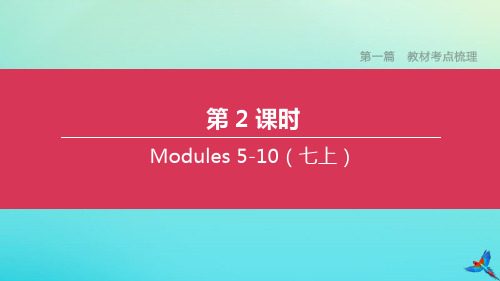
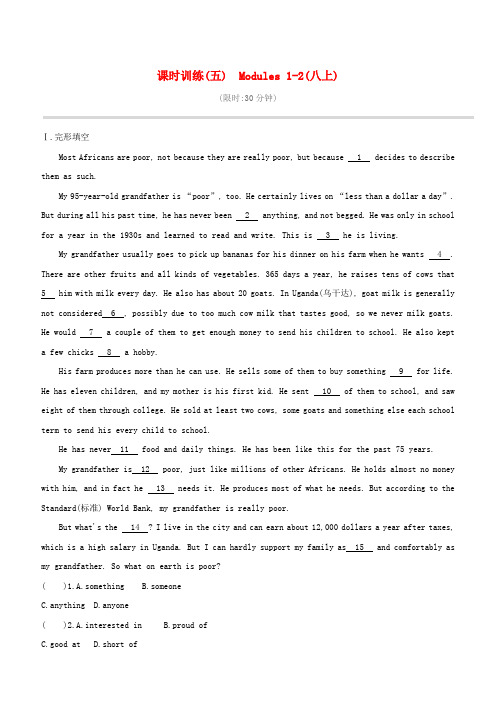
课时训练(五) Modules 1-2(八上)(限时:30分钟)Ⅰ.完形填空Most Africans are poor, not because they are really poor, but because 1 decides to describe them as such.My 95-year-old grandfather is “poor”, too. He certainly lives on “less than a dollar a day”. But during all his past time, he has never been 2 anything, and not begged. He was only in school for a year in the 1930s and learned to read and write. This is 3 he is living.My grandfather usually goes to pick up bananas for his dinner on his farm when he wants 4 . There are other fruits and all kinds of vegetables. 365 days a year, he raises tens of cows that 5 him with milk every day. He also has about 20 goats. In Uganda(乌干达), goat milk is generally not considered 6 , possibly due to too much cow milk that tastes good, so we never milk goats. He would 7 a couple of them to get enough money to send his children to school. He also kept a few chicks 8 a hobby.His farm produces more than he can use. He sells some of them to buy something 9 for life. He has eleven children, and my mother is his first kid. He sent 10 of them to school, and saw eight of them through college. He sold at least two cows, some goats and something else each school term to send his every child to school.He has never 11 food and daily things. He has been like this for the past 75 years.My grandfather is 12 poor, just like millions of other Africans. He holds almost no money with him, and in fact he 13 needs it. He produces most of what he needs. But according to the Standard(标准) World Bank, my grandfather is really poor.But what's the 14 ? I live in the city and can earn about 12,000 dollars a year after taxes, which is a high salary in Uganda. But I can hardly support my family as 15 and comfortably as my grandfather. So what on earth is poor?( )1.A.something B.someoneC.anythingD.anyone( )2.A.interested in B.proud ofC.good atD.short of( )3.A.why B.whatC.howD.where( )4.A.food B.speedC.moneyD.ability( )5.A.allow B.requireC.provideD.offer( )6.A.special B.healthyC.expensiveD.delicious( )7.A.buy B.sellC.stealD.keep( )8.A.than B.throughC.byD.as( )9.A.proud B.popularC.creativeD.necessary( )10.A.all B.mostC.someD.none( )11.A.sent out B.ended upC.worried aboutD.depended on( )12.A.found B.provedC.consideredD.suggested( )13.A.just B.nearlyuallyD.seldom( )14.A.truth B.secretC.reasonD.method( )15.A.wisely B.easilyC.quicklyD.heavilyⅡ.词汇运用(ⅰ)用方框中所给词语的适当形式填空。
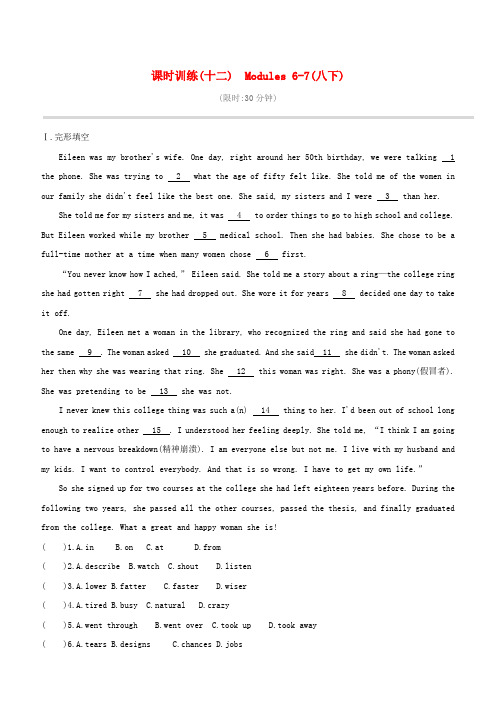
课时训练(十二) Modules 6-7(八下)(限时:30分钟)Ⅰ.完形填空Eileen was my brother's wife. One day, right around her 50th birthday, we were talking 1 the phone. She was trying to 2 what the age of fifty felt like. She told me of the women in our family she didn't feel like the best one. She said, my sisters and I were 3 than her.She told me for my sisters and me, it was 4 to order things to go to high school and college. But Eileen worked while my brother 5 medical school. Then she had babies. She chose to be a full-time mother at a time when many women chose 6 first.“You never know how I ached,” Eileen said. She told me a story about a ring—the college ring she had gotten right 7 she had dropped out. She wore it for years 8 decided one day to take it off.One day, Eileen met a woman in the library, who recognized the ring and said she had gone to the same 9 . The woman asked 10 she graduated. And she said 11 she didn't. The woman asked her then why she was wearing that ring. She 12 this woman was right. She was a phony(假冒者). She was pretending to be 13 she was not.I never knew this college thing was such a(n) 14 thing to her. I'd been out of school long enough to realize other 15 . I understood her feeling deeply. She told me, “I think I am going to have a nervous breakdown(精神崩溃). I am everyone else but not me. I live with my husband and my kids. I want to control everybody. And that is so wrong. I have to get my own life.”So she signed up for two courses at the college she had left eighteen years before. During the following two years, she passed all the other courses, passed the thesis, and finally graduated from the college. What a great and happy woman she is!( )1.A.in B.on C.at D.from( )2.A.describe B.watch C.shout D.listen( )3.A.lower B.fatter C.faster D.wiser( )4.A.tired B.busy C.natural D.crazy( )5.A.went through B.went over C.took up D.took away( )6.A.tears B.designs C.chances D.jobs( )7.A.after B.before C.until D.behind( )8.A.for B.or C.but D.so( )9.A.school B.familyC.campD.activity( )10.A.what B.when C.where D.why( )11.A.patiently B.excitedlyC.proudlyD.actually( )12.A.helped B.restedC.thoughtD.said( )13.A.someone B.everyoneC.somethingD.everything( )14.A.strange B.hugeC.angryD.small( )15.A.secrets B.choicesC.dreamsD.tasksⅡ.阅读理解The United Kingdom, officially known as the United Kingdom of Great Britain and Northern Ireland, is a state located at the northwest of Europe. The United Kingdom has four countries: England, Scotland, Wales and Northern Ireland.It is one of the most powerful, and richest countries in the world. It is an amazing piece of land that is rich in history and facts, some of which are yet to be discovered. From the natural beauty to the people, technological advancement(科技进步) and sports, no one can ever have enough of the UK. To learn more about the country, you should read the facts below.The English drink the most tea in the world. They drink over 163 million cups of tea daily, about 20 times the number of cups drunk by Americans.Although Britain has been involved in many wars lasting for many years, it has also been involved in the shortest war. The Anglo-Zanzibar War fought in 1896 lasted only 45 minutes, just the time for a class.The UK has the highest rate(比率) of being very fat in the world. Almost 25% of the British adults are very fat.The UK has the third highest rate of the heart disease in Europe. It ranks(排位) just belowIreland and Finland.Of all countries that celebrate Independence Day, 58 are independent of the UK, the highest by any country.Almost 25% of all women in the UK were named Mary in 1811.According to history, the London Bridge had indeed fallen down according to the old rhyme, when the Saxons had torn it down using ropes and boats. The Thames has over 200 bridges and tunnels along its course.1.The first paragraph introduces the of the UK. ( )A.peopleB.countriesC.weatherD.culture2.When did the Anglo-Zanzibar War happen? ( )A.In 1896.B.In 1811.C.In 1800.D.In 1897.3.What did the writer use most to tell the truth? ( )A.Stories.B.Examples.C.Numbers.D.Reasons.4.The passage mainly tells us the of the UK. ( )A.cultureB.fun factsC.scienceD.agricultureⅢ.任务型阅读下面短文中有四处(第1-4)需要添加小标题。
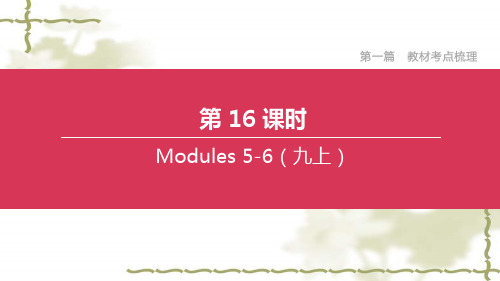
课时训练(十五) Modules 3-4(九上)(限时:30分钟)Ⅰ.完形填空It was more than 80 years ago, when an army quietly passed across the Yudu River in Ganzhou, Jiangxi. They were the Chinese Central Red Army. They decided to start a 1 and hard march. It was 2 known as the Long March. This year is the 83rd year of the victory of the famous march. Let's learn something about it.During the Long March, the Chinese Central Red Army passed many places. They 3 from Jiangxi, passed through several provinces and finally arrived in Shaanxi. It is said that they 4 about 25,000 li (about 12,500 kilometres) during the Long March.At school, you may have learned in books that soldiers 5 many difficulties. They lived a 6 life and fought against the enemies. They crossed Chishuihe for four times, 7 many kinds of difficulties. In Sichuan, soldiers spent a hard time creeping(匍匐) across Luding Chain Bridge, which was 8 13 iron chains(铁链), in the middle of gun fire. They also climbed 9 the snowy Jiajin Mountain, which was 4,930 metres high. They didn't have enough food to eat, so they often went 10 for days. And they didn't have enough 11 to stay away from the cold. Many soldiers 12 . About 86,000 people took part in the march, 13 only about 7,000 were left when they arrived in Shaanxi.Today, we can visit the places that they once passed through. This way, we may truly understand the 14 of the Long March: Never be 15 of difficulties and never give up hope.( )1.A.short B.longC.slowD.quick( )2.A.finally B.graduallyC.famouslyD.probably( )3.A.returned B.studiedC.hidD.started( )4.A.drove B.flewC.walkedD.rode( )5.A.looked through B.went throughC.thought ofD.heard of( )6.A.hard B.normalC.boringD.successful( )7.A.remaining B.makingC.avoidingD.facing( )8.A.made up of B.made intoC.made byD.made for( )9.A.through B.overC.intoD.on( )10.A.hungry B.thirstyC.lonelyD.angry( )11.A.energy B.moneyC.matchesD.clothes( )12.A.escaped B.diedC.criedD.feared( )13.A.though B.becauseC.soD.but( )14.A.influence B.meaningC.spiritD.result( )15.A.afraid B.shyC.tiredD.proudⅡ.[2019·聊城]阅读理解Is a nearby neighbour better than a faraway cousin? An American lady, Anna Lane, believes it's true. Her kind neighbours once helped her out when she was in a big trouble.Mrs Lane was living alone in a city in Texas, the US. The woman in her 70s could do a lot of housework herself. However, she was too old to mow(裁剪) her lawn(草坪). Then a big trouble found her. She let the grass grow over 18 inches high and it broke the law in her city. As a result, she was in danger of paying lots of money or even going to prison! Luckily, her neighbours, the Adams brothers, heard the news about her on TV. They decided to do something to help.“We haven't met her yet, but she's 75 years old and she needs some help,” said Sam Adams, one of the boys. “That's the least we could do.”The Adams brothers took their mowers(修剪机) and came to Mrs Lane's house to mow her lawn without telling her. Once they got started, other neighbours saw what was going on and joined in the effort.Together they worked hard in the sun and finished mowing the whole lawn in about two hours. When Mrs Lane saw what her neighbours did for her, she was surprised and moved to tears(感动得落泪). “I cannot believe this,” she said. “They were so kind to spend two hours helping me and I didn't even know their names.” As for the Adams brothers, they said they would always be ready to help her.1.What can we know about Mrs Lane? ( )A.She was 70 years old.B.She could not do her housework.C.She was living with her children.D.She could not cut the grass on the lawn.2.Mrs Lane was in danger of going to prison because . ( )A.she broke the education law in her cityB.the grass on her lawn was over 18 inches highC.the news about her on TV was made up by herD.she didn't pay enough money to her neighbours3.Who mowed the lawn? ( )A.The Adams brothers.B.Sam Adams and Mrs Lane.C.The Adams brothers and Mrs Lane.D.The Adams brothers and other neighbours.4.Which of the following is true? ( )A.The Adams brothers knew Mrs Lane very well.B.Mrs Lane knew some of her neighbours' names.C.Mrs Lane didn't expect her neighbours would help her.D.The Adams brothers used Mrs Lane's mowers to cut the grass.5.The best title(题目) for the passage would be . ( )A.Good neighboursB.A serious city lawC.A beautiful gardenD.Humorous brothersⅢ.词汇运用(ⅰ)用方框中所给词语的适当形式填空。
课时训练(三) Modules 1-6(七下)(限时:30分钟)Ⅰ.[2019·衢州]完形填空Last October, I told my pupils in Pompton School about my plan. “I'd like you to do jobs to make some 1 ,” I said. “Then we'll buy food for someone in need.”I wanted them to experience that it's 2 to give than to receive. I hoped they could experience a sense of their own ability to make a change.Early in Thanksgiving week, the children couldn't wait to 3 . Before paying for the turkey and other food we chose in the supermarket, Kristine cried.“Flowers!” And the group all ran toward the holiday 4 .“You can't eat flowers!” I said 5 . After all, it was helpful to buy more food.“But Mrs Sherlock,” came the loud 6 , “we want flowers.”In the middle of the plants, there was a pot of unusually purple mums. “7 will like this one,” the children agreed.8 the address of a poor grandmother who had lived alone for years, we set off. An hour later, we stopped in front of a small house. A thin woman with a 9 face came to meet us.As the kids carried all the food in, the old woman oohed and aahed—much to her visitors' pleasure. When Amy put the mums on the table, the woman seemed 10 . “She's wishing it was a bag of food,”I thought.“11 is your close friend in the woods?” Michael asked.The woman brightened.“The birds. They often fly over for food 12 I share my bread with them,” she said.Then we returned to the car. Through the window we saw her walk past the turkey, straight to the 13 . She put her face in them and looked up with a big smile. She was 14 before our eyes!In that one short moment, the children had seen for themselves the 15 they owned to make a change. Sometimes a person needed a pot of nice purple flowers on a dark November day.( )1.A.friends B.mistakesC.moneyD.room( )2.A.cheaper B.betterC.saferD.funnier( )3.A.take a walk B.do houseworkC.have a restD.go shopping( )4.A.cards B.campsC.plantsD.photos( )5.A.unhappily B.warmlyC.carelesslyD.freely( )6.A.voice B.musicC.soundD.noise( )7.A.He B.IC.YouD.She( )8.A.At B.WithC.InD.After( )9.A.proud B.fatC.sadD.handsome( )10.A.relaxed B.boredC.worriedD.surprised( )11.A.Who B.HowC.WhyD.Where( )12.A.although B.butC.becauseD.if( )13.A.books B.flowersC.woodsD.rooms( )14.A.changed B.brokenC.treatedD.refused( )15.A.habit B.abilityC.interestD.courageⅡ.[2019·台州]阅读理解Brooke wanted a dollhouse and some sugar cookies. So the 6-year-old asked Alexa to get them. Alexa wasn't her mum or babysitter. It was a voice-activated home assistant powered by AI (人工智能). And it made Brooke's wishes come true. A few days later, much to her parents' surprise, a $170 dollhouse and 4 pounds of cookies showed up. They ate the cookies and gave away the dollhouse to a local hospital. And that's not the end of the story. When a news reporter told the story of what happened on TV, Alexa devices(设备) in many listeners' homes woke up and tried to order dollhouses!Alexa isn't the only AI willing to serve you. Apple Homepod has Siri, Google Home has its Assistant, and the upcoming Galaxy Home device will have Bixby. People who have these devices use them mainly for listening to music, checking the weather, and setting timers. According to a report from The Information, nowadays voice shopping is rare. But many scientists predict a boom(增长) in voice shopping in the near future. Is that a good thing?. You can shout out an order as soon as you think of it, even if you are cooking, cleaning, or driving. In addition, people with disabilities who are unable to use a keyboard or mouse can shop without any help.But voice shopping has its disadvantages. Unwanted dollhouses aren't the biggest problem. It's usually very easy to cancel an order or return products. The thing that worries some people is that these assistants are always listening. They have to be able to respond when you want them. So they listen for “Alexa” or “OK Google” or another order. When they hear it, they start recording the conversation. Some have worried about what happens to these recordings. Should companies be allowed to use them to learn about people's shopping habits? And what if someone hacks(入侵) the device? The CIA found a way to hack smart TVs to turn them into spies that listen all the time. Others could do the same with any smart device.What do you think? Are you ready to start voice shopping?1.From the passage, we know that Alexa . ( )A.can look after the babyB.can cook delicious foodC.is a toy doll sold onlineD.is one kind of AI device2.The underlined word “rare” in Paragraph 2 probably means . ( )A.unusualB.expensiveC.harmfulD.impossible3.Which of the following is the best to fill in the “” in Paragraph 3?( )A.Convenience is the main advantage of voice shoppingB.The cost of voice shopping is lower than other waysC.The popularity of voice shopping is increasingD.The technology of voice shopping needs improving4.Paragraph 4 mainly tells us that when people try voice shopping. ( )A.AI sometimes forgets people's ordersB.personal information might be hackedC.it's difficult to cancel or return productsD.the needs for products can't be satisfiedⅢ.词汇运用(ⅰ)用方框中所给词语的适当形式填空。